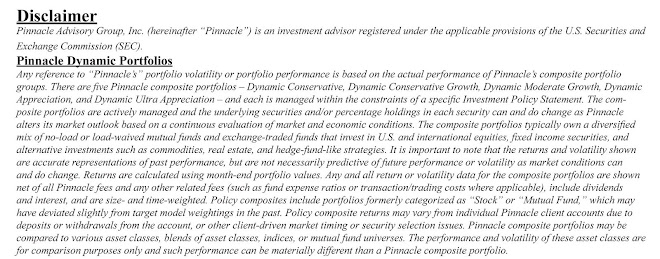This morning’s headline in The Washington Post reads, “Boehner seeks to release new debt strategy.” Once again I find myself lamenting how our job as investors has changed from being able to understand the business cycle to understanding the political cycle. Perhaps it’s because our offices are so close to DC where folks might be a little bit more “inside the beltway” in terms of their politics than other places around the country, but we have always had a firm rule not to express our personal opinions about politics with clients. Over the years this rule has served us well, with the exception of one memorable client dinner where an older client felt I had besmirched the reputation of George Bush by making a few comments about tax policy and she made certain that I knew, in very clear and uncertain terms, that she was a tried and true Republican who had attended the Bush inauguration. As I recall I ended up down on one knee (I’m not kidding, she was seated at the dinner table and I was on one knee talking to her) apologizing for any misunderstanding or hard feelings I may have caused about her political views. If Mindy Gasthalter, one of our wealth managers, is reading this, could you please stop laughing?
I have stated many times that I believe that no meaningful “grand compromise” will be reached in the U.S. about the state of our budget deficit until the financial markets impose a solution. We have just put together a series of questions and answers for Pinnacle clients that walks through the reasons that we feel that the likelihood of a “market riot” is still small...the high probability is that this isn’t the moment that financial markets will melt down over the issue. The problem is that brinksmanship politics demands that politicians take this debate up to the very last moment and create maximum fear and anxiety in order to cut the best possible deal from their own partisan point of view. Isn’t it too bad that the country has to be held hostage as we go through this childish process?
That we are forced to try and guess when the financial markets will punish politicians for playing this game of poker with the debt ceiling is ridiculous. The political class knows very well the implications for not reaching a solution to the debt ceiling debate. With one week to go they are now going to try and “bluff” the rating agencies that may downgrade U.S. debt if the compromise solution merely “kicks the can down the road” in terms of a meaningful reduction in the deficit. The problem is that our politicians reflect that partisan nature of the electorate, and the electorate is so divided between “haves” and “have nots” that the political process itself doesn’t seem to work anymore. I recently wrote a paper which quoted Francois Trahan’s recent conclusion that “macro’ forces were currently responsible for more than 80% of stock market volatility. I’m guessing that politics, both here and in Europe and in China, must contribute 70% of the 80%. I am SO ready to go back to studying earnings and interest rates.
skip to main |
skip to sidebar
Subscribe via email
Who is Echoing from the Pit
This blog represents the individual opinions of the Investment Team at Pinnacle Advisory Group in Columbia, Maryland
The Investment Team comprises:
Ken Solow, CFP, CLU, ChFC
Rick Vollaro, CPA
Carl Noble, CFA
Sean Dillon
Sauro Locatelli
To learn more about Pinnacle please visit our website at http://www.pinnacleadvisory.com/
The Investment Team comprises:
Ken Solow, CFP, CLU, ChFC
Rick Vollaro, CPA
Carl Noble, CFA
Sean Dillon
Sauro Locatelli
To learn more about Pinnacle please visit our website at http://www.pinnacleadvisory.com/
About Me
- Echoes from the Pit
- Columbia, Maryland, United States
Pinnacle in the News
Blog Archive
-
▼
2011
(169)
-
▼
July
(13)
- Risks Inherent in Risk Protection
- Triple Digit Oil - Again
- Debt Ceiling Q&A
- On Politics
- Finally Growing into “The New Normal”
- Tail Risks
- The Hathaway Effect
- As the Government Turns…
- Was It Ever In Doubt?
- Earth to Jobs, Where Are You?
- Big Week but We Need Bigger
- $200 Billion in the Room
- New Holding: Aerospace and Defense ETF
-
▼
July
(13)

